Fiddler on the Roof heads to the West End
 Johan Persson
Johan PerssonFiddler on the Roof continues to have an impact on popular culture today in ways you might not even realise.
Take, for example, Lin-Manuel Miranda - the man behind In The Heights and the hugely successful Hamilton.
Miranda has repeatedly said his writing has been heavily influenced by Fiddler, which was first staged in 1964.
The classic musical tells the story of a poor milkman, Tevye, who wants to find good husbands for his five daughters, and struggles to accept that modern life is changing.
It may be set in the Jewish community of a pre-revolutionary Russian village, but its fans argue the themes and principles of the show are universal.
"We realised we could learn an enormous amount from Fiddler," Miranda said in 2012 about the process of developing In The Heights.
"That opening number of Fiddler [Tradition] is a masterpiece... Tevye takes you through the world.
"He's like, 'This is my family, these are my daughters, these are the other special people in our village, and then these are the outsiders in the village, and that's exactly the set-up of the opening number of In the Heights."
And Miranda took his love for Fiddler to another level when he performed one of the numbers, To Life, at his own wedding.
 Reuters
ReutersMore widely, the show remains highly popular with audiences - and now a recent London production of the musical which was been warmly welcomed by critics is to transfer to the West End.
From April, Fiddler on the Roof will move from its current home at Menier Chocolate Factory to the Playhouse Theatre.
"It's a really extraordinary piece of writing, both as a play and a musical," the show's star Andy Nyman tells BBC News.
"You've got some of the greatest songs ever written in there, which people know and love even if they don't know they're from the show."
The music has been reversioned and reimagined several times over the years - one of the best-known examples is by Gwen Stefani, who took If I Were A Rich Man and flipped the genders for her 2005 smash Rich Girl.
And the show itself seems to be one that directors and producers just can't leave alone.
 Johan Persson
Johan PerssonIt has has been revived on Broadway five times over since its debut, and its last West End revival was just over a decade ago. A film adaptation, released in 1971, won three of the eight Oscars it was nominated for.
The Menier's new production has received glowing reviews from critics, including those in The Guardian, WhatsOnStage, The Sunday Times and The Evening Standard.
Writing in Gay Times, Chris Selman described it as a "magnificent revival", adding: "This fiddler raises the roof."
But, pointed out John Nathan in Metro: "If the show gets the West End transfer it deserves, the challenge will be to preserve the Menier's intimacy."
Nyman responds: "That's a challenge that everybody is aware of, so one of the really exciting things is the theatre we're going to is being reconfigured,
"So you're not going to be seeing a traditional proscenium arch Fiddler where you sit in the audience and watch the action going on 40 feet away from you.
"The theatre will instead be similar to what the Chocolate Factory is, so we'll be right in the middle of the audience."
Nyman's raw and rugged performance in the show has been praised by critics, with Andrzej Lukowski writing in Time Out: "He's not really a quintessential musical theatre actor, but being a bit rough around the edges helps his cause here."
 Getty Images
Getty Images"With a magnificent beard and a stack of charisma, he puts in a hugely dedicated performance as a wearily loving father trying to do his best to bend with the tides of history."
Nyman says he feels "honoured" to have been given the role and to now be taking the show to the West End.
"The play is incredibly funny... and what's remarkable about it is it's absolutely universal," he says.
"I mean, one of the places Fiddler has proved most popular in the world is Japan, because you have this notion of how families survive without tradition."
This is true - the show's success in the country has been remarkable given the absence of a significant Jewish history in Japan.
But according to Koji Aoshika, the vice president of Musical Theatre International in Asia, the show has particular resonance in the country.
Speaking to Tablet last year, he said: "The show is about tradition, father-daughter relationships, Japan was the same; you had to follow what the father said - arranged marriage, for instance.
"So, the story of a Jewish father losing power in the family and girls starting to make their own decisions resonates. As the majority of musical theatre-goers in Japan is 20-to-40-something female, I believe the show makes them think of their own relationships with their fathers."
Although the show might not sound relatable to all audiences on paper, Nyman argues its themes have wide appeal.
"If you have kids, it makes you think of your relationship with them, and if you don't, it makes you think about your relationship with your parents, and what it was like when you left them and moved home. It is such a profound piece of writing."

Fiddler on the Roof opens at the London Playhouse on 21 March, running until 15 June,
